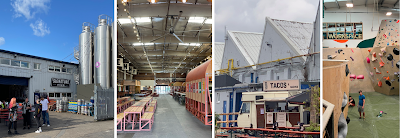How can London’s existing industrial spaces help us to re-imagine sustainable futures of city-making?
We live in an era led by the mantra of economic growth at any cost. While the UN Sustainable Development Goals challenges cities to make urban living more inclusive, safe, resilient, and sustainable, the current and predominant model of reproduction of space in London is still based on privately financed regeneration projects which, almost always, result in the complete demolition of the existing urban fabric and the replacement of it with high value real estate.
In this process, environmental and social goals are used to justify the replacement of the existing buildings, communities, and activities, while the social and environmental costs of replacement, as well as its long terms effects, are given little consideration. But what would happen if the existing city, users, and activities were to be the starting point for regeneration?
This year Unit A will explore this question by engaging with local makers, users, and activities across the Blackhorse Lane area in Waltham Forest, elected in 2021 as one of the Mayor of London’s Creative Enterprise Zones (CEZ): “Creative Enterprise Zones are a Mayoral initiative to designate areas of London where artists and creative businesses can find permanent affordable space to work; are supported to start-up and grow; and where local people are helped to learn creative sector skills and access pathways to employment.” Mayor of London (2022).
At the same time that Blackhorse Lane area was designated a CEZ in recognition of the broad and rich community of makers and creatives that have been making innovative use of the existing light industrial buildings and spaces that historically occupy the Lea Valley, Waltham Forest council has launched a masterplan, that seeks to demolish and replace the entire area with the objective of bringing different uses in, such as residential, and intensifying the industrial use that already exists.
The questions arising from this situation and ‘tabula-rasa’ approach will become the focus of our investigation the academic year 2023-24. We will set out to better understand the relationships between the existing Blackhorse Collective creative industries and the wider Waltham Forest community, to think and propose alternative models of space production and architecture, that consider, repair and re-qualify the existing city, and by doing so, can make space for different uses and intensify the activities in more socially and environmentally sustainable ways.
In collaboration with local partners, we will sample and draw existing socio-spatial conditions and activities across the study area, to better understand their operations and re-imagine how they could be connected to each other in a Circular Economy system that is designed to retain and recover as much value as possible from the existing activities and site resources. This investigation will form the basis us to develop strategic architectural interventions which enable and enhance the system and explore the question of how do the parts connect and can work together?
